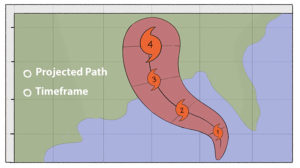
Click Here to watch a short video about preparing for a hurricane
This tutorial is about preparing for hurricanes but can apply to other severe weather events. For hurricanes, you know they’re coming which is helpful. While we know the projected path and timeframe of the storm, So does everyone else so the first lesson is:
Prepare BEFORE the storm is on the horizon. Remember too, once the storm is hitting your area, things change quickly.
=Here is a partial list of major planning considerations.
Life Survival
Medical
Environmental
Essentials
Tips and myths
Remember, all of these will be affected by your particular needs.
Life Survival
Water – Buy the long term storage type as well as water purification equipment. Fill a bleach-cleaned bathtub with fresh water and cover it with tin-foil —use it for cleaning.
Emergency food high in protein and carbohydrates.
Shelter building material such as tarps. Shelter is often the thing people miss when they’re planning but it can be vitally important.
Anything specific you or your family needs, such as medicine.
Environmental
Solar powered equipment is great, but remember the solar banks have to be charged often—now is a good time to check them.
After a hurricane a heat wave often follows so, again, shelter is critical. Also, limit activity in the warmest part of the day and have a plan for rapid cooling measures in the event of heat exhaustion. Heat Stroke can be deadly and requires immediate radical cooling.
If you have animals, plan to crate them so they don’t try to run away. One of the most common tragedies during emergencies is people getting hurt or killed trying to rescue a pet.
If you have a small boat, sink it with weights so it doesn’t break loose and drift away. Weigh down canoes and kayaks so you can find them later. Attach a marker with several feet of string to help.
A bicycle with sturdy tires and a large carry basket can be a life-saver.
Medical
Arrange with your doctor for an auxiliary supply of required medications.Stock up on Benadryl, aspirin, Tylenol, Advil, and Pepto Bismal – but don’t begin new supplements or medications you are not familiar with.
Have an emergency medical kit and know how to use it. Take a first aid or responder class in advance.
Essentials
A small gas grill with extra gas canisters – camping stoves work well –remember outside only. A deck of cards and some simple board games to help fight boredom. A wrench, channel locks and pliers to assist in turning off utilities in your home.
Have some headlamps with extra batteries, they can be incredibly helpful in allowing you to see at night while keeping your hands free. They can also help you keep track of everyone in your family or survival group in the dark. Just remember to avoid shining them in other people’s eyes, that is really annoying and can spark a medical condition in some people.
Everyone should have a sturdy knife, preferably a fixed blade but a folder is fine if it is well made..
Binoculars so you can see who is coming.
Duct tape, super glue, plastic sheeting, tarps, a tent repair kit, bungee cord & paracord. All of which can go into a backpack so you can carry it with you if necessary.
Non-prescription reading glasses in various strengths — because –you know– you might need to read something.
Tips and Myths
Tip: If you have a food vacuum sealer, that’s a great way to store specific gear, such as medicines. It helps preserve them, plus you are less likely to dip into the stockpile when you run out of aspirin. Put the date of the first medicine to expire on the outside of the bag so you know when to go in and replace it.
Myth: Taping windows is necessary.
This is simply not true, not only is it not effective, it can actually make shattered windows more dangerous because the tape holds more of the sharp, broken glass together. There are verified cases of people dying from being hit by these larger shards. Covering windows with plywood (purchased in advance) or pre-installed storm shutters do work.
Tip: Safeguard important documents, such as deeds and passports. This is another use for that vacuum sealer.
Myth: The greatest risk to life in a hurricane is wind.
Not true –wind can be dangerous. But flooding and storm surge are far more dangerous. Waters can rise very quickly so be prepared to flee.
Tip: The “category” of a hurricane may not be as important as you think. In fact, according to the National Weather Service, in the future we are likely to see slower moving storms that will dump massive amounts of rain on an area. These storms are likely to be a lower category but more deadly.
Myth: If you open a door or window, it will stabilize the pressure inside and outside the house.
This is not true and actually makes you more vulnerable to flood waters and flying debris.
MENTAL PREPARATION
Finally, a word about state-of-mind: Just because you have survived other natural disasters without much preparation does not mean you have some magical ability to survive the next one.
While we believe it makes sense to keep responses appropriate for the level of danger, remember that just being optimistic is never a good plan. Being prepared, trained, and equipped makes much more sense if you want to survive. Here are at Learn To Survive, we can help you or your organization with these preparations as well as a host of other survival and emergency situations.
To find out more about what we can do for you, your family or your group give us a call at 318.505.7674
Or click here to send us an Email and we will get in touch with you.